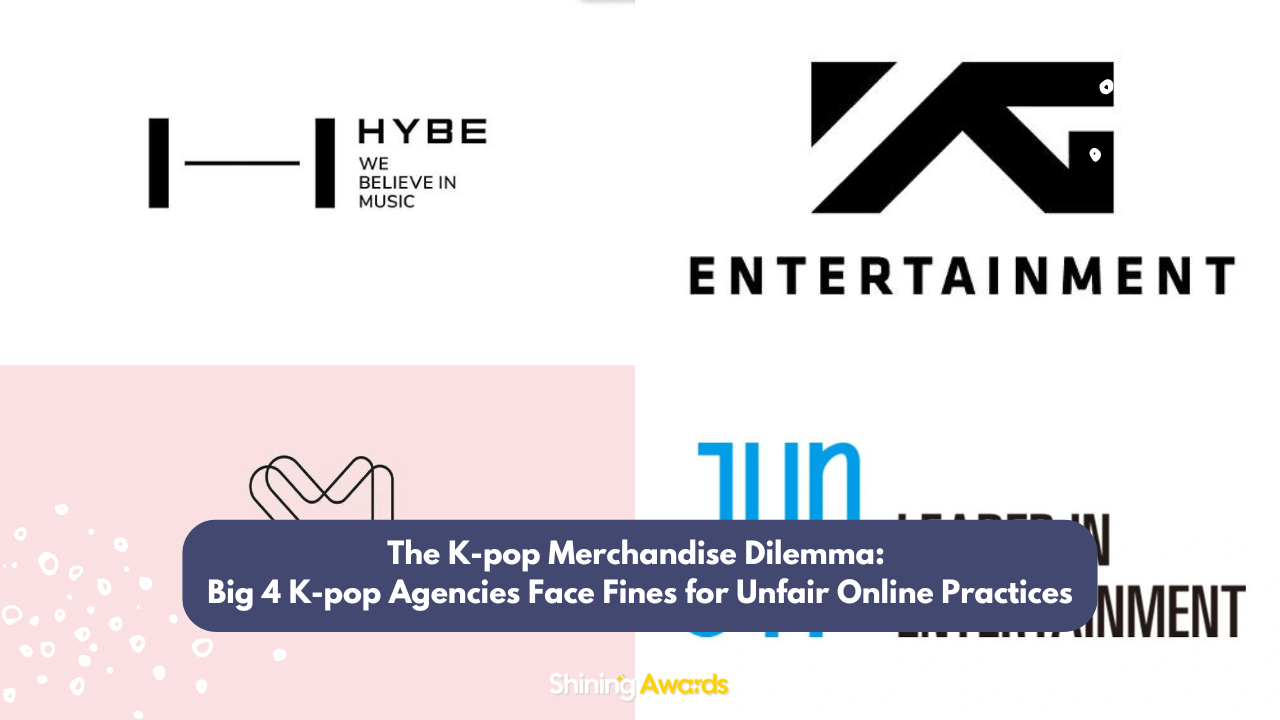The K-pop Merchandise Dilemma: Big 4 K-pop Agencies Face Fines for Unfair Online Practices

Big 4 K-pop Agencies – In the glittering world of K-pop, where idols reign supreme and fans eagerly snap up every piece of merchandise, a recent development has shed light on the darker side of the industry’s e-commerce practices. The Fair Trade Commission (FTC) of South Korea has taken a stand against the Big 4 K-pop agencies, imposing fines and issuing corrective orders for violations of consumer protection laws. This move has sent ripples through the K-pop community, highlighting the need for fair practices in the booming online merchandise market.
Big 4 K-pop Agencies Face Fines for Unfair Online Practices

The Big 4 Under Scrutiny
The FTC’s investigation targeted the online stores of four major entertainment powerhouses:
- Weverse Company (HYBE)
- YG Plus (YG Entertainment)
- SM Brand Marketing (SM Entertainment)
- JYP Three Sixty (JYP Entertainment)
These companies, collectively known as the Big 4 K-pop agencies, have been at the forefront of the global K-pop phenomenon. However, their e-commerce practices have now come under fire for violating the ‘Electronic Commerce Act’, resulting in a total fine of 10.5 million KRW (approximately $7,700 USD).
Unpacking the Violations
The FTC’s investigation revealed a pattern of unfair practices across the Big 4 K-pop agencies‘ online stores. Let’s break down some of the key issues:
- Shortened Refund Periods: Contrary to legal requirements, companies like SM imposed strict seven-day return policies, counting from the delivery date rather than the receipt date.
- Unreasonable Return Conditions: Some agencies required customers to film unboxing videos as proof for missing items, shifting the burden of proof unfairly onto consumers.
- Limited Compensation Timeframes: Weverse, SM, and JYP set arbitrary deadlines for compensation claims on lost items, disregarding the legal three-month claim period.
- Packaging Restrictions: Certain stores prevented returns if packaging was opened or damaged, even though the law permits returns in such cases for content verification.
- Event-Related Purchase Policies: YG’s no-cancellation policy for event-related purchases (like fan signing events) after the application period contradicted consumer rights to cancel before winner announcements.
These practices not only violated consumer protection laws but also created significant barriers for fans seeking fair treatment in their purchases from Big 4 K-pop agencies.
The Impact on K-pop Fans
The revelations about these unfair practices have left many K-pop enthusiasts feeling disillusioned. Fans often spend considerable sums on merchandise to support their favorite idols, viewing these purchases as investments in their passion. The restrictive policies of the Big 4 K-pop agencies have, in many cases, left fans without recourse when faced with issues like missing or defective items.
Consider the case of a fan who eagerly awaits a limited-edition album, only to find it damaged upon arrival. Under some of the previous policies, they might have been unable to return or exchange the item simply because they opened the packaging to inspect it. This scenario, now highlighted by the FTC’s actions, underscores the importance of fair e-commerce practices in maintaining the trust between K-pop agencies and their dedicated fan bases.
A Broader Industry Issue
While the focus has been on the Big 4 K-pop agencies, this situation raises questions about industry-wide practices. Smaller agencies and independent artists may also need to reassess their online store policies to ensure compliance with consumer protection laws. The FTC’s action serves as a wake-up call for the entire K-pop industry to prioritize fair treatment of consumers in the digital marketplace.
Steps Towards Resolution
In response to the FTC’s investigation, all four companies have taken steps to voluntarily correct their policies. This proactive approach resulted in lower fines than might have otherwise been imposed. However, the incident serves as a reminder of the ongoing need for vigilance in protecting consumer rights, even in industries driven by passion and fandom.
The Future of K-pop E-commerce
As the K-pop agencies adjust their practices to align with legal requirements, fans can expect to see several positive changes:
- Clearer return and refund policies
- Extended timeframes for reporting issues with purchases
- Fairer treatment regarding packaging and product inspection
- More reasonable policies for event-related purchases
These changes should lead to a more consumer-friendly environment, potentially increasing fan satisfaction and loyalty in the long run.
Lessons for Global E-commerce
The case of the Big 4 K-pop agencies offers valuable lessons for e-commerce businesses worldwide:
- Transparency is key: Clear, upfront policies can prevent misunderstandings and build trust with customers.
- Legal compliance is non-negotiable: Regardless of industry specifics, adhering to consumer protection laws is essential.
- Customer-centric approach pays off: Prioritizing customer satisfaction can lead to long-term success and brand loyalty.
- Regular policy reviews are crucial: As e-commerce evolves, companies must continually assess and update their practices.
Conclusion: A New Era for K-pop Merchandise
The FTC’s action against the Big 4 K-pop agencies marks a significant moment in the industry’s history. It underscores the importance of balancing passionate fandom with fair business practices. As these major players adjust their policies, we can hope for a ripple effect throughout the K-pop merchandise ecosystem, leading to improved experiences for fans worldwide.
For K-pop enthusiasts, this development promises a future where supporting their favorite idols through merchandise purchases comes with the assurance of fair treatment and respect for their consumer rights. As the industry continues to grow and evolve, maintaining this balance will be crucial for sustaining the magical connection between K-pop stars and their dedicated global fanbase.
The Big 4 K-pop agencies have faced a challenging moment, but with the right approach, they can turn this into an opportunity to strengthen their relationship with fans and set new standards for e-commerce excellence in the entertainment industry.
